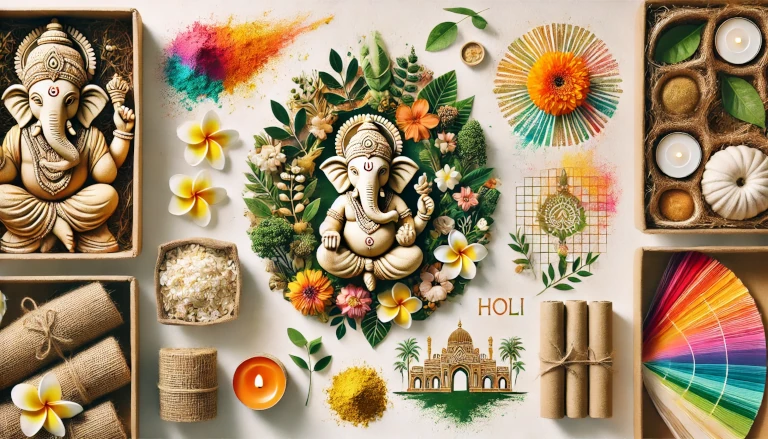India is known for its rich cultural heritage, festivals, and traditions, which hold significant value in the lives of its people. From grand weddings to vibrant festivals like Diwali, Holi, and Durga Puja, Indian cultural celebrations are full of joy and community spirit. However, many of these celebrations can also lead to environmental harm due to the use of non-biodegradable materials, excessive water usage, and high energy consumption. Lets Balance “Cultural Traditions with Sustainability” !
To preserve both cultural traditions and the environment, there is a growing need to balance these rituals with sustainability. In this guide, we explore how we can enjoy Indian cultural traditions while being mindful of the planet, offering practical solutions and examples.
Why Is It Important to Balance Traditions with Sustainability? 🌍
Cultural practices are deeply ingrained in society, often passed down through generations. However, many of these traditions, when practiced on a large scale, have unintended environmental consequences.
- Impact on the Environment: Festivals often lead to increased pollution, waste generation, and depletion of natural resources. For example, the burning of firecrackers during Diwali leads to air pollution, while Holi’s synthetic colors pollute water bodies.
- Preserving Heritage: By adopting eco-friendly alternatives, we can continue to celebrate traditions without damaging the environment, ensuring they are sustainable for future generations.
- Global Movement Toward Sustainability: With increasing awareness of climate change and environmental degradation, it’s essential that all communities contribute toward sustainable practices, including during cultural celebrations.
How to Balance Indian Traditions with Sustainability? ⚖️
1. Eco-Friendly Festival Celebrations 🎉
- Diwali: Instead of using firecrackers that emit harmful gases, opt for eco-friendly fireworks, LED lighting, or community light shows. Use clay diyas instead of plastic decorations and choose natural flowers for rangoli designs.
- Holi: Use natural colors made from flowers, turmeric, and other organic materials instead of synthetic, chemical-laden powders. Encourage community water-saving Holi events and use dry color instead of water balloons to conserve water.
- Ganesh Chaturthi: Instead of large, chemically painted idols, choose eco-friendly Ganesha idols made from clay or cow dung, which dissolve naturally in water without harming marine life.
2. Sustainable Weddings 💒
Indian weddings are often elaborate, multi-day events that generate a lot of waste. Here’s how to make them more sustainable:
- Eco-Friendly Invitations: Use recycled paper invitations or digital invites to reduce paper waste.
- Sustainable Décor: Opt for decorations made from natural materials like flowers, bamboo, and jute instead of plastic or synthetic options.
- Reduce Food Waste: Ensure caterers donate excess food to shelters or food banks and use reusable cutlery and plates instead of disposable ones.
- Destination Weddings: Encourage eco-conscious practices by choosing eco-friendly venues that focus on minimizing waste and promoting sustainability.
3. Sustainable Clothing and Fabrics 👗
Traditional Indian clothing, such as sarees, lehengas, and kurtas, can also be made more sustainable by:
- Choosing Organic Fabrics: Opt for clothing made from organic cotton, jute, khadi, or bamboo. These materials require fewer pesticides and water during production.
- Supporting Local Artisans: Promote handmade textiles from local artisans, which are often more sustainable and support traditional crafts.
- Reusing and Recycling Attire: Instead of buying new outfits for every occasion, try repurposing old garments or swapping outfits with friends and family.
When Should You Start Adopting Sustainable Practices? 🕰️
The time to act is now. With every festival or event, you have the opportunity to make sustainable choices. Begin by:
- Planning Ahead: Early planning allows you to choose eco-friendly options for invitations, décor, and gifts.
- Raising Awareness: Encourage friends and family to adopt sustainable practices. Even small changes, like switching to eco-friendly decorations or reducing waste, can have a significant impact.
Advantages of Balancing Traditions with Sustainability 🌱
- Environmental Benefits: Reducing pollution, saving water, and conserving energy all contribute to a healthier planet.
- Long-Term Cost Savings: While eco-friendly options may seem costly upfront, they often result in savings in the long run, as items like reusable décor and clothing can be used multiple times.
- Cultural Preservation: Sustainable practices ensure that traditions can be maintained without causing harm to the environment, allowing future generations to enjoy them.
Disadvantages and Challenges 🌍
- Availability of Sustainable Alternatives: In some areas, eco-friendly products may be less accessible or more expensive compared to traditional options.
- Resistance to Change: Some people may be reluctant to adopt new practices due to attachment to long-standing traditions.
- Education and Awareness: Raising awareness about the environmental impact of certain cultural practices can be challenging in communities where knowledge of sustainability is limited.
Examples of Successful Sustainable Celebrations in India 🌿
- Green Diwali Campaigns: Several cities in India, including Delhi and Mumbai, have launched “Green Diwali” initiatives, encouraging the use of eco-friendly diyas, LED lights, and banning firecrackers to reduce air pollution.
- Eco-Friendly Ganesh Chaturthi: In recent years, eco-friendly Ganesha idols made of clay, seeds, and even chocolate (which can be immersed in milk and then distributed) have gained popularity.
Embracing Sustainability Without Losing Tradition 🌸
Indian culture is rich and diverse, with traditions that bring people together and create joy. By integrating sustainability into these practices, we can preserve the essence of these celebrations while protecting the environment for future generations. Whether it’s through eco-friendly décor, sustainable fashion, or conscious consumption, every small effort counts in creating a more sustainable future. Let’s celebrate the beauty of Indian culture in a way that honors both tradition and the earth.
Discover more from Green Ecosystem - Renewable Energy, Agriculture, and Environmental Sustainability
Subscribe to get the latest posts sent to your email.


